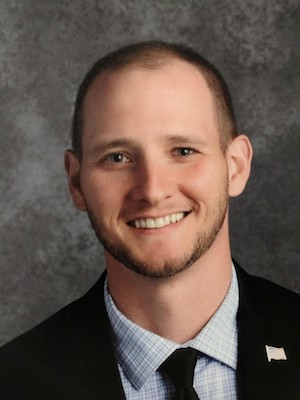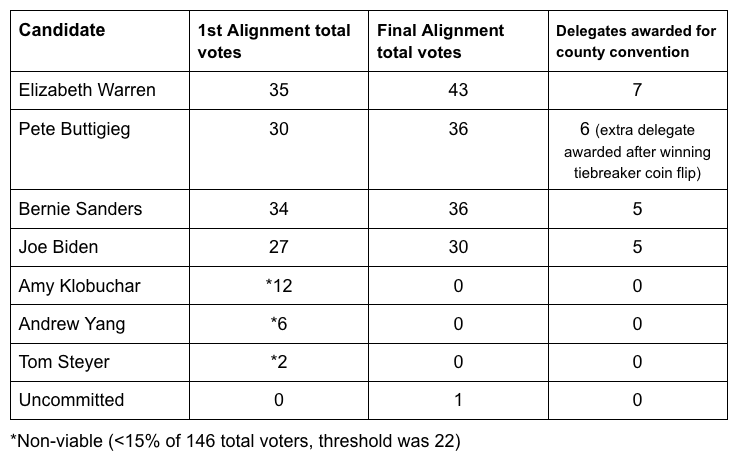Michael J. Jacobsen works in higher education, is a father of two, and is a former high school government, U.S. history, world history, geography, psychology, sociology, world political theory, and economics teacher. He resides in Williamsburg, Iowa and welcomes comments at jacobsenmike84@gmail.com. -promoted by Laura Belin
February 3, 2020, the day after the Super Bowl (and my birthday), was going to be a day to remember. Iowa was to kick off the “official” beginning to the 2020 election season. I was honored to be asked to serve as the caucus chair for the Williamsburg precinct in Iowa County for the Democrats.
I had caucused before, but not with the buildup and number of presidential candidates this one would have, and certainly never “running the show.” However, despite what the national media has reported regarding the problems with the reporting app (mostly justified), the delay in results, and other issues, these caucuses — for me — will be remembered for the many positives as well.
For instance, looking out from my table in the gym at Mary Welsh Elementary School, I could see a diverse coalition of voters who all cared enough about the future of this country to show up on a cold, Monday night in February, in Iowa, and let their voices be heard. These friends and neighbors were of all ages, social classes, and political persuasions. People got out of their comfort zones, stood up in front of the crowd, took the microphone and spoke with passion on behalf of their preferred candidate. Despite that passion, the night proceeded with respect, generosity, and kindness on full display.
Much has already been written on the shortcomings of the reporting app, but I have to say it did work for me as caucus chair. It certainly was not without its problems in the test phase, however, as well as in many other precincts throughout the state. Much of the blame can and should go to the state party leaders who approved the purchase and use of the app, as well as the developers themselves who obviously did their jobs very poorly. It was also head-scratching to see that the Democratic National Committee, which nixed the use of smartphone technology for the “virtual caucus,” apparently thought it fine to use in the reporting of the vote.
Despite some of these shortcomings, the caucus proceedings ran very smoothly overall, with multiple people coming up to me during and after the event to say how well they thought things went. This was a credit to my caucus secretary and the numerous volunteers who pitched in and helped.
My faith in democracy was also restored in that one voice really does still matter. For example, after the first division into preference groups, a young man came up to me to say he did not want to choose another candidate for the second alignment. He was within his right to do this, but since there was still time left, I asked him to talk with others, think it over, and then make a final decision.
Although he leaned towards Bernie Sanders, he chose not to realign. After doing the final count, that meant a coin flip was needed to break the tie between Sanders and Pete Buttigieg, which Buttigieg won. In this instance, Buttigieg received one more delegate to go on to the county convention. So to those who still think and may say, “One vote doesn’t matter,” it truly does.
The final counts for the Williamsburg “city” precinct were as follows:
I’m not sure whether Iowa will keep our first-in-the-nation status. This year’s cycle did no favors for our reputation. The national media already denigrates our caucus process, citing Iowa’s lack of diversity compared to the country overall, and the time it took to report results, as negative factors. The timing and locations of the caucuses also makes it tough to participate for those with young children, mobility issues, working third shift, etc. Some of this criticism is justified.
However, the sincerity with which Iowans treat the process, the relatively cheap advertising that can be done in this state compared to others, and the ability to engage people in the democratic process — connecting with friends and neighbors in a way that regular primary voting does not facilitate — are all still positive outcomes of holding the first nominating contest in Iowa.
Fostering an educated and engaged citizenry is one of the biggest challenges facing our country today, and the caucus process helps nurture these essential traits for a healthy democracy. Furthermore, in our most populous and diverse state, California, it takes weeks to report their voting numbers, instead of the days it has taken to report Iowa’s. So, as with many other things in life, the grass isn’t always greener on the other side.
Regardless of what the future holds, this precinct chair, Iowan, and American still believes in the process. I still believe in our democracy. I still believe that individuals can affect change and let their voices be heard. I still believe in individual freedom and liberty but also in the greater good. I still believe in the best of America — in all of us — and that our best days are yet to come…if we’re willing to come together and work for them.


